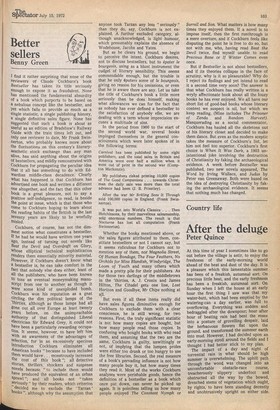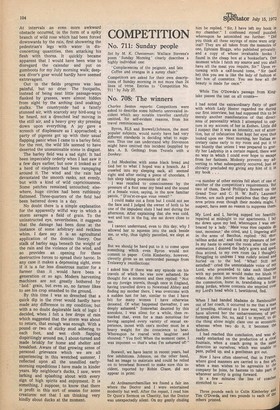Country life
After the deluge
Peter Quince
At this time of year I sometimes like to go out before the village is astir, to enjoy the freshness of the early-morning world ahead of the heat and dust of the day. It is a pleasure which this lamentable summer has been of a freakish, autumnal sort. On precious little heat, and the early freshness has been a freakish, autumnal sort. On Sunday when I left the house at an early hour the first thing I saw was that my water-butt, which had been emptied by the watering-can a day earlier, was full to overflowing. Everything was sodden and bedraggled after the downpour; hour after hour of beating rain had bent the roses into a posture of grovelling despair, laid the herbaceous flowers flat upon the ground, and transformed the summer earth into mud. However, I had decided upon an early-morning stroll around the fields and I thought I had better stick to my plan.
The impact of a day and night of torrential rain in what should be high summer is overwhelming. The uphill path through the wood was changed into an uncomfortable obstacle-race course, treacherously slippery underfoot and obstructed all the way by the bowed, drenched stems of vegetation which ought, by rights, to have been standing decently and unobtrusively upright on either side.
At intervals an even more awkward obstacle occurred, in the form of a spiky branch of wild rose which had been forced downwards by the rain, first showering the pedestrian's legs with water in disconcerting quantities, then attacking his flesh with thorns. It quickly became apparent that I would have been wise to disregard the calendar and put on gumboots for my July morning walk; deepsea diver's gear would hardly have seemed extravagant.
Out in the fields progress was less painful, but no drier. The footpaths, instead of being neat little passage-ways flanked by grasses, were almost hidden from sight by the arching (and soaking) stalks. The countryside had a faintly stunned air, with scarcely any bird-song to be heard, not a drenched leaf moving in the still air, and a heavy grey sky pressing down upon everything. A jay gave a screech of displeasure as I approached; a party of pigeons got up with their usual flapping panic when I came to a barley field; for the rest, the wild life seemed to have deserted the unseasonable scene in disgust.
The barley field was a sad sight. It had been impeccably orderly when I last saw it a few days earlier, but now it looked as if a herd of elephants had been rampaging around it. The wind and the rain had devastated the smooth ranks, not evenly, but with a kind of wild capriciousness. Some patches remained untouched; elsewhere, huge circles had been ruthlessly flattened. Three-quarters of the field had been battered down in a day.
No doubt there is a simple explanation for the apparently wilful way in which a storm savages a field of grain. To the uninstructed eye, nevertheless, it suggests that the damage has been done at the instance of some arbitrary and reckless whim. I dare say it is an agricultural application of the domino theory. One stalk of barley sags beneath the weight of the rain and the violence of the wind, and so provides an opening for these destructive forces to spread their havoc. In any case it makes a depressing sight, even if it is a far less disastrous matter for a farmer than it would have been a generation or so ago. Modern harvesting machines are not greatly bothered by ' laid ' grain, but even so, no farmer likes to see his crop smashed to the ground.
By this time I was so drenched that a quick dip in the river would hardly have made any difference to my condition; but with a no doubt deplorable lack of logic I decided, when I felt a few drops of rain which suggested that the storm was about to return, that enough was enough. With a pound or two of sticky mud adhering to each foot, and wet cloth flapping dispiritingly around me, I about-turned and made briskly for home and shelter and breakfast. Aware of that growing sense of personal grievance which we are all experiencing in this wretched summer, I reflected upon all the unsullied earlymorning expeditions I have made in kinder years. My neighbour's ducks, I saw, were larking and splashing about with every sign of high spirits and enjoyment. It is something, I suppose, to know that there is profit in this sort of season for some creatures: not that I am thinking very kindly about ducks at the moment.











































 Previous page
Previous page